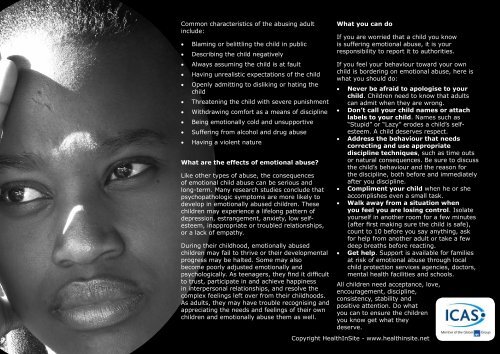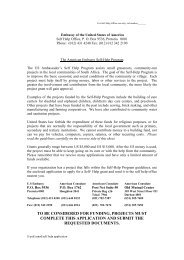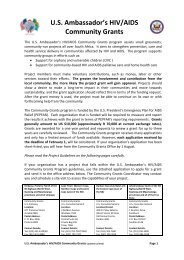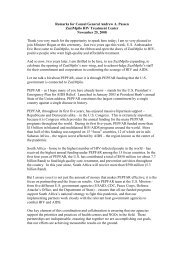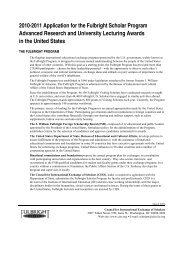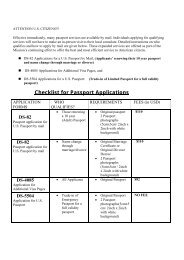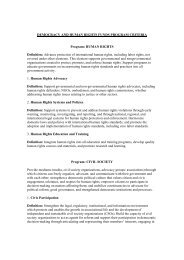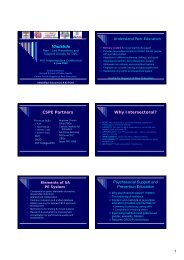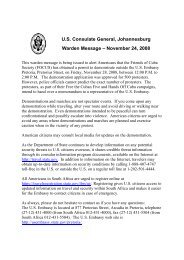Warning signs of emotional abuse (pdf) - South Africa
Warning signs of emotional abuse (pdf) - South Africa
Warning signs of emotional abuse (pdf) - South Africa
Create successful ePaper yourself
Turn your PDF publications into a flip-book with our unique Google optimized e-Paper software.
Common characteristics <strong>of</strong> the abusing adult<br />
include:<br />
• Blaming or belittling the child in public<br />
• Describing the child negatively<br />
• Always assuming the child is at fault<br />
• Having unrealistic expectations <strong>of</strong> the child<br />
• Openly admitting to disliking or hating the<br />
child<br />
• Threatening the child with severe punishment<br />
• Withdrawing comfort as a means <strong>of</strong> discipline<br />
• Being <strong>emotional</strong>ly cold and unsupportive<br />
• Suffering from alcohol and drug <strong>abuse</strong><br />
• Having a violent nature<br />
What are the effects <strong>of</strong> <strong>emotional</strong> <strong>abuse</strong><br />
Like other types <strong>of</strong> <strong>abuse</strong>, the consequences<br />
<strong>of</strong> <strong>emotional</strong> child <strong>abuse</strong> can be serious and<br />
long-term. Many research studies conclude that<br />
psychopathologic symptoms are more likely to<br />
develop in <strong>emotional</strong>ly <strong>abuse</strong>d children. These<br />
children may experience a lifelong pattern <strong>of</strong><br />
depression, estrangement, anxiety, low selfesteem,<br />
inappropriate or troubled relationships,<br />
or a lack <strong>of</strong> empathy.<br />
During their childhood, <strong>emotional</strong>ly <strong>abuse</strong>d<br />
children may fail to thrive or their developmental<br />
progress may be halted. Some may also<br />
become poorly adjusted <strong>emotional</strong>ly and<br />
psychologically. As teenagers, they find it difficult<br />
to trust, participate in and achieve happiness<br />
in interpersonal relationships, and resolve the<br />
complex feelings left over from their childhoods.<br />
As adults, they may have trouble recognising and<br />
appreciating the needs and feelings <strong>of</strong> their own<br />
children and <strong>emotional</strong>ly <strong>abuse</strong> them as well.<br />
What you can do<br />
If you are worried that a child you know<br />
is suffering <strong>emotional</strong> <strong>abuse</strong>, it is your<br />
responsibility to report it to authorities.<br />
If you feel your behaviour toward your own<br />
child is bordering on <strong>emotional</strong> <strong>abuse</strong>, here is<br />
what you should do:<br />
• Never be afraid to apologise to your<br />
child. Children need to know that adults<br />
can admit when they are wrong.<br />
• Don’t call your child names or attach<br />
labels to your child. Names such as<br />
“Stupid” or “Lazy” erodes a child’s selfesteem.<br />
A child deserves respect.<br />
• Address the behaviour that needs<br />
correcting and use appropriate<br />
discipline techniques, such as time outs<br />
or natural consequences. Be sure to discuss<br />
the child’s behaviour and the reason for<br />
the discipline, both before and immediately<br />
after you discipline.<br />
• Compliment your child when he or she<br />
accomplishes even a small task.<br />
• Walk away from a situation when<br />
you feel you are losing control. Isolate<br />
yourself in another room for a few minutes<br />
(after first making sure the child is safe),<br />
count to 10 before you say anything, ask<br />
for help from another adult or take a few<br />
deep breaths before reacting.<br />
• Get help. Support is available for families<br />
at risk <strong>of</strong> <strong>emotional</strong> <strong>abuse</strong> through local<br />
child protection services agencies, doctors,<br />
mental health facilities and schools.<br />
All children need acceptance, love,<br />
encouragement, discipline,<br />
consistency, stability and<br />
positive attention. Do what<br />
you can to ensure the children<br />
you know get what they<br />
deserve.<br />
Copyright HealthInSite - www.healthinsite.net


